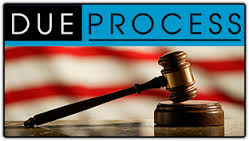Slowing Down the SEC Administrative Train
 I am convinced that the law eventually reaches the “right” solution. There may be disastrous detours along the way, but in the end the law will adapt to reach the right result. Of course, our history is replete with instances of controversial, and ultimately embarrassing, court decisions (e.g. Plessy v. Ferguson).
I am convinced that the law eventually reaches the “right” solution. There may be disastrous detours along the way, but in the end the law will adapt to reach the right result. Of course, our history is replete with instances of controversial, and ultimately embarrassing, court decisions (e.g. Plessy v. Ferguson).
Nor do I mean to suggest that the SEC’s reliance on administrative hearings for prosecuting enforcement actions is a momentous issue, or anything that comes close to a significant legal trend in our nation’s history. But judges are starting to question the SEC’s reliance on administrative hearings as a fair forum for defendants to exercise due process.
The SEC’s administrative powers, while limited in scope at the time of its enactment, were greatly expanded by the Sarbanes-Oxley Act in 2002, and again by Section 929P(a) of the Dodd-Frank Act in 2010. Respectively, these laws enable the SEC to obtain administrative orders barring defendants from serving as officers and directors of registered companies and assess monetary penalties.
Thus far in 2015, 78% of all enforcement actions brought by the SEC have been pursued in administrative proceedings, rather than in federal courts. The SEC’s preference for administrative proceedings over court actions is likely explained in part by its track records in the two forums; for fiscal year 2014, the SEC won only 61% of the actions that it instituted in federal courts, while it won 100% of the actions brought before its Administrative Law Courts.
Defendants fighting the SEC’s decision to initiate administrative proceedings against them have filed federal court actions seeking to enjoin the SEC, arguing that the process violates the equal protection and due process clauses of the Constitution. A number of courts have denied these requests on procedural grounds, holding that plaintiffs must first go through the SEC process—which involves a trial before an in-house judge and an appeal to the five SEC Commissioners—before a federal circuit court can consider the claims.
In the few cases where the court held it had subject matter jurisdiction to hear a due process challenge, the plaintiffs made either facial due process challenges or equal protection arguments.
A federal district court in Atlanta, Georgia, recently decided in favor of a defendant in an ALJ proceeding on non-jurisdictional, non-equal protection grounds. In Hill v. Securities Exchange Commission, 2015 U.S. Dist. LEXIS 74822, Fed. Sec. L. Rep. (CCH) P98, 539 (N.D. Ga. June 8, 2015), U.S. District Judge Leigh Martin May held that the SEC had violated the Appointments Clause by subjecting the defendant, Charles Hill, to proceedings before an administrative law judge who was not directly accountable to the President, SEC officials, or the federal courts. The court rejected the SEC’s claim that ALJs were “mere employees,” finding instead that ALJs’ were in fact inferior officers.
Because the court found that ALJs were likely inferior officers who, in accordance with the Appointments Clause, “must be appointed by the President, department heads, or courts of law,” the court concluded that Hill had established a likelihood of success on the merits with regards to his Second Amendment claims, as the ALJ overseeing the pending administrative proceeding had not been appointed in compliance with constitutional requirements.
On August 4, 2015, Judge May also granted a preliminary injunction in a another case, Gray Financial Group, Inc. v. SEC, based on a similar analysis as had been applied in Hill.
Following the Hill ruling, Judge Berman of the U.S. District Court for the Southern District of New York issued an order preliminarily enjoining the SEC’s administrative proceeding in Duka v. SEC, 15 Civ. 357 (RMB)(SN)(S.D.N.Y. Aug. 12, 2015). Like the Hill court, Judge Berman concluded that ALJs were “inferior officers” under the Constitution, and that they werenot  appointed by the SEC Commissioners. […] As they were not appropriately appointed pursuant to Article II, their appointment is likely unconstitutional in violation of the Appointments Clause.
appointed by the SEC Commissioners. […] As they were not appropriately appointed pursuant to Article II, their appointment is likely unconstitutional in violation of the Appointments Clause.
Although the Duka and Hill courts both ruled – at least at the preliminary injunction stage – that the SEC’s administrative proceedings are likely to be in violation of the Appointments Clause, the most recent court ruling on this subject found in favor of the SEC, and denied a suit brought by a plaintiff seeking to enjoin the SEC. In that case, Bebo v. SEC, the Seventh Circuit concluded that the lower court did not have subject matter jurisdiction to consider the constitutional challenge and rules that the plaintiff could raise any constitutional challenges to the administrative proceeding on appeal from any final decision at the administrative level. Similar cases are now pending before the D.C. Circuit and the Eleventh Circuit.















